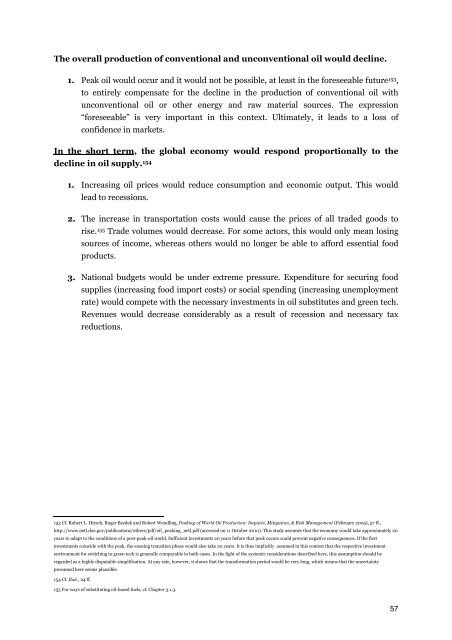PEAK OIL
PEAK OIL
PEAK OIL
Create successful ePaper yourself
Turn your PDF publications into a flip-book with our unique Google optimized e-Paper software.
The overall production of conventional and unconventional oil would decline.<br />
1. Peak oil would occur and it would not be possible, at least in the foreseeable future153 ,<br />
to entirely compensate for the decline in the production of conventional oil with<br />
unconventional oil or other energy and raw material sources. The expression<br />
“foreseeable” is very important in this context. Ultimately, it leads to a loss of<br />
confidence in markets.<br />
In the short term, the global economy would respond proportionally to the<br />
decline in oil supply. 154<br />
1. Increasing oil prices would reduce consumption and economic output. This would<br />
lead to recessions.<br />
2. The increase in transportation costs would cause the prices of all traded goods to<br />
rise. 155 Trade volumes would decrease. For some actors, this would only mean losing<br />
sources of income, whereas others would no longer be able to afford essential food<br />
products.<br />
3. National budgets would be under extreme pressure. Expenditure for securing food<br />
supplies (increasing food import costs) or social spending (increasing unemployment<br />
rate) would compete with the necessary investments in oil substitutes and green tech.<br />
Revenues would decrease considerably as a result of recession and necessary tax<br />
reductions.<br />
153 Cf. Robert L. Hirsch, Roger Bezdek and Robert Wendling, Peaking of World Oil Production: Impacts, Mitigation, & Risk Management (February 2005), 57 ff.,<br />
http://www.netl.doe.gov/publications/others/pdf/oil_peaking_netl.pdf (accessed on 11 October 2010). This study assumes that the economy would take approximately 20<br />
years to adapt to the conditions of a post-peak-oil world. Sufficient investments 20 years before that peak occurs could prevent negative consequences. If the first<br />
investments coincide with the peak, the ensuing transition phase would also take 20 years. It is thus implicitly assumed in this context that the respective investment<br />
environment for switching to green tech is generally comparable in both cases. In the light of the systemic considerations described here, this assumption should be<br />
regarded as a highly disputable simplification. At any rate, however, it shows that the transformation period would be very long, which means that the uncertainty<br />
presumed here seems plausible.<br />
154 Cf. Ibid., 24 ff.<br />
155 For ways of substituting oil-based fuels, cf. Chapter 3.1.3.<br />
57


